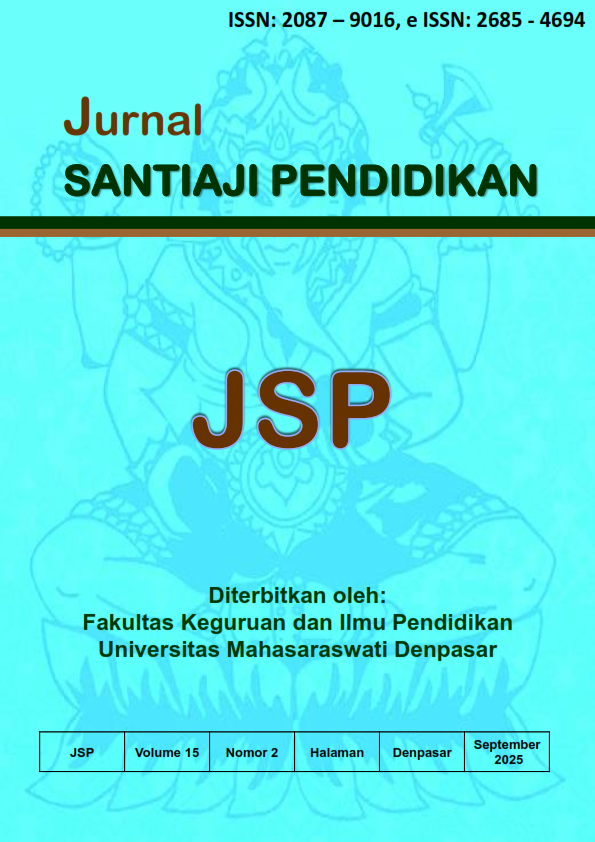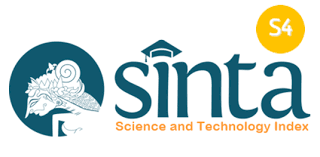ENGLISH LANGUAGE TEACHING (ELT) POLICY IN THE AI ERA: CHALLENGES AND OPPORTUNITIES
DOI:
https://doi.org/10.36733/jsp.v15i2.12356Keywords:
AI, English language teaching, perspectives, policy, teacher agencyAbstract
In recent years, the rapid advancement of Artificial Intelligence (AI) has brought significant implications for English Language Teaching (ELT). This study explores school principals and English teachers’ perspectives on the integration of AI in ELT within the context of existing policy. It aims to examine how teachers perceive current ELT policies in the AI era, the challenges they face in implementing AI-based tools, and the opportunities to bridge the gap between policy and classroom practice. Using a qualitative descriptive approach, survey and structured interview were conducted with multiple informants across different educational levels, involving respondents with diverse professional backgrounds: English teachers, vice headmasters for academic and curriculum affairs, and headmasters. The survey results indicate that respondents strongly understand current English language learning policies and agree on the urgency of integrating AI developments, digital literacy, and academic literacy into policy and planning. However, while most believe AI-based policies can have a positive impact, they note that current policies are not yet fully supportive of AI integration. Thematic analysis revealed three key findings: (1) the absence of clear and comprehensive ELT policy frameworks addressing AI integration, (2) teachers’ proactive adaptation through self-initiated practices and resource exploration, and (3) persistent challenges related to digital literacy, infrastructure, and ethical considerations. These results indicate that while respondents demonstrate strong agency in navigating AI-based innovations, sustainable integration requires well-defined policies and needs-based professional development.
Downloads
References
Abedi, E. A. (2024). Tensions between technology integration practices of teachers and ICT in education policy expectations: Implications for change in teacher knowledge, beliefs and teaching practices. Journal of Computers in Education, 11(4), 1215–1234. https://doi.org/10.1007/s40692-023-00296-6
Ayeni, O. O., Hamad, N. M. A., Chisom, O. N., Osawaru, B., & Adewusi, O. E. (2024). AI in education: A review of personalized learning and educational technology. GSC Advanced Research and Reviews, 18(2), 261–271. https://doi.org/10.30574/gscarr.2024.18.2.0062
Chan, C. K. Y. (2023). A comprehensive AI policy education framework for university teaching and learning. International Journal of Educational Technology in Higher Education, 20(1), 38. https://doi.org/10.1186/s41239-023-00408-3
Cong-Lem, N. (2021). Teacher agency: A systematic review of international literature. Issues in Educational Research, 31(3), 718–738. https://search.informit.org/doi/10.3316/informit.190851857034060
Crompton, H., Edmett, A., Ichaporia, N., & Burke, D. (2024). AI and English language teaching: Affordances and challenges. British Journal of Educational Technology, bjet.13460. https://doi.org/10.1111/bjet.13460
Harintama, F., & Muslimin, A. I. (2024). Enhancing EFL teaching in Indonesian Islamic senior high schools through artificial intelligence integration. Schemata: Jurnal Pascasarjana UIN Mataram, 13(2), 111–122. https://doi.org/10.20414/schemata.v13i2.11818
Jin, Y., Yan, L., Echeverria, V., Gašević, D., & Martinez-Maldonado, R. (2025). Generative AI in higher education: A global perspective of institutional adoption policies and guidelines. Computers and Education: Artificial Intelligence, 8, 100348. https://doi.org/10.1016/j.caeai.2024.100348
Kaswan, K. S., Dhatterwal, J. S., & Ojha, R. P. (2024). AI in personalized learning. In Advances in technological innovations in higher education (First edition, p. 15). CRC Press. https://doi.org/10.1201/9781003376699
Liddicoat, A. J., & Taylor-Leech, K. (2021). Agency in language planning and policy. Current Issues in Language Planning, 22(1–2), 1–18. https://doi.org/10.1080/14664208.2020.1791533
Masduqi, H., & Prihananto, N. (2021). Communicative approach in the five curricula of English subject for secondary schools: A paradox in English language teaching in Indonesia. https://doi.org/10.14293/S2199-1006.1.SOR-.PPHBZCF.v1
McLure, F. I., & Aldridge, J. M. (2023). Sustaining reform implementation: A systematic literature review. School Leadership & Management, 43(1), 70–98. https://doi.org/10.1080/13632434.2023.2171012
Nezhad, P. M., & Stolz, S. A. (2024). Unveiling teachers’ professional agency and decision-making in professional learning: The illusion of choice. Professional Development in Education, 1–21. https://doi.org/10.1080/19415257.2024.2349058
Nurhayati, S., Taufikin, T., Judijanto, L., & Musa, S. (2025). Towards effective artificial intelligence-driven learning in Indonesian child education: Understanding parental readiness, challenges, and policy implications. Educational Process International Journal, 15(1). https://doi.org/10.22521/edupij.2025.15.155
Poquet, O., & De Laat, M. (2021). Developing capabilities: Lifelong learning in the age of AI. British Journal of Educational Technology, 52(4), 1695–1708. https://doi.org/10.1111/bjet.13123
Pramerta, I. G. P. A. (2025). In-service teachers’ voices on AI utilization in education. Jurnal Santiaji Pendidikan (JSP), 15(1), 90–100. https://doi.org/10.36733/jsp.v15i1.10733
Pratolo, B. W., & Solikhati, H. A. (2020). Investigating teachers’ attitude toward digital literacy in EFL classroom. Journal of Education and Learning (EduLearn), 15(1), 97–103. https://doi.org/10.11591/edulearn.v15i1.15747
Sarkar, A. (2025). Bridging the divide: A systems thinking approach to inclusivity in AI development and education. https://doi.org/10.2139/ssrn.5097669
Schiff, D. (2022). Education for AI, not AI for education: The role of education and ethics in national AI policy strategies. International Journal of Artificial Intelligence in Education, 32(3), 527–563. https://doi.org/10.1007/s40593-021-00270-2
Shan, Z. (2025). Is successful implementation possible? Unraveling the implementation of English language education policy in China. SAGE Open, 15(3), 21582440251359014. https://doi.org/10.1177/21582440251359014
Wang, J., Tigelaar, D. E. H., & Admiraal, W. (2022). From policy to practice: Integrating ICT in Chinese rural schools. Technology, Pedagogy and Education, 31(4), 509–524. https://doi.org/10.1080/1475939X.2022.2056504
Weng, Z. (2025). A Language Teacher Educator’s Identity and Agency Development via Virtual Professional Training: An Autoethnography. TESOL Journal, 16(2), e70027. https://doi.org/10.1002/tesj.70027
Yekollu, R. K., Bhimraj Ghuge, T., Sunil Biradar, S., Haldikar, S. V., & Farook Mohideen Abdul Kader, O. (2024). AI-driven personalized learning paths: Enhancing education through adaptive systems. In R. Asokan, D. P. Ruiz, & S. Piramuthu (Eds.), Smart Data Intelligence (pp. 507–517). Springer Nature Singapore. https://doi.org/10.1007/978-981-97-3191-6_38
Downloads
Published
Issue
Section
License
Copyright (c) 2025 Pramerta I Gde Putu Agus

This work is licensed under a Creative Commons Attribution 4.0 International License.











